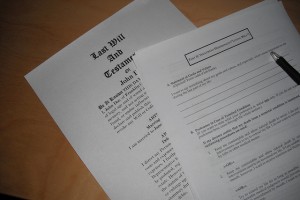 When someone dies, the disposition of their personal items, heirlooms and keepsakes are often the greatest source of contention among their surviving family members. However, during their lifetime many people fail to make arrangements to direct how those personal items should be distributed upon their death. Sometimes they make verbal assurances to certain family members during their lifetime, promising to leave them certain items upon death, but those promises are never put into writing. In order to avoid conflicts over the distribution of such items, and possibly avoid a lifetime of hard feelings between surviving relatives, it’s important to properly address these issues in your estate plan.
When someone dies, the disposition of their personal items, heirlooms and keepsakes are often the greatest source of contention among their surviving family members. However, during their lifetime many people fail to make arrangements to direct how those personal items should be distributed upon their death. Sometimes they make verbal assurances to certain family members during their lifetime, promising to leave them certain items upon death, but those promises are never put into writing. In order to avoid conflicts over the distribution of such items, and possibly avoid a lifetime of hard feelings between surviving relatives, it’s important to properly address these issues in your estate plan.
WHAT IS TANGIBLE PERSONAL PROPERTY?
The term tangible personal property refers to items of a personal nature, including things such as household goods, furniture, furnishings, jewelry, precious stones, photographs, books, silverware, china, crystal, antiques, paintings, sculptures and other works of art, collections, clothing, tools, machinery, equipment, appliances, automobiles, watercraft, recreational vehicles and equipment, pets, and other such personal effects
Tangible personal property does not include assets such as money, real estate, securities, stocks, bank accounts, investment accounts, promissory notes, IOU’s, or similar assets. Continue reading

 Wisconsin has become the 37th state to do away with the so-called “Deadman’s Statute” after a November ruling by the State Supreme Court repealed the 158-year-old law. The intent of the statute was to prevent “interested parties”—anyone with a stake in the outcome of estate litigation—from testifying about conversations they had with a deceased or incompetent person.
Wisconsin has become the 37th state to do away with the so-called “Deadman’s Statute” after a November ruling by the State Supreme Court repealed the 158-year-old law. The intent of the statute was to prevent “interested parties”—anyone with a stake in the outcome of estate litigation—from testifying about conversations they had with a deceased or incompetent person. It seems like challenges to
It seems like challenges to  Legacies for companion animals have made the news many times in recent years, from the $12 Million that hotel mogul Leona Helmsley tried to leave her Maltese terrier in 2007, to the full range of support that Joan Rivers left her four dogs. While it is not often that you can pull solid life lessons from the tabloids, these stories offer great advice and guidance. They show how common it is becoming for owners to plan for the care of their pets in their
Legacies for companion animals have made the news many times in recent years, from the $12 Million that hotel mogul Leona Helmsley tried to leave her Maltese terrier in 2007, to the full range of support that Joan Rivers left her four dogs. While it is not often that you can pull solid life lessons from the tabloids, these stories offer great advice and guidance. They show how common it is becoming for owners to plan for the care of their pets in their  There is no question about it; lawyers are not cheap. The concern over costs often drives individuals to try handling certain legal tasks on their own. This is especially true in the realm of
There is no question about it; lawyers are not cheap. The concern over costs often drives individuals to try handling certain legal tasks on their own. This is especially true in the realm of